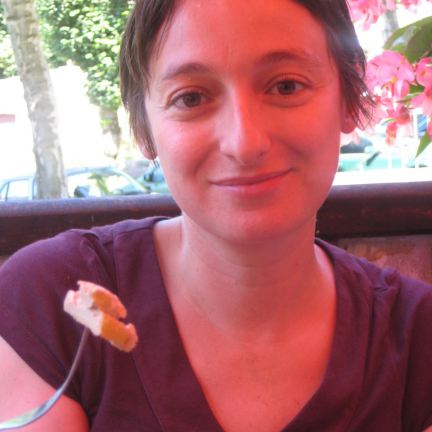Zapp, the instant grocery delivery startup that launched in 2020 in London, has picked up a substantial round of funding to go head-to-head with Getir, Gopuff, Jiffy, Deliveroo and the many others hungry for a share of the on-demand convenience market. It has raised $200 million, a Series B round of funding that Zapp said it will use both to beef up its presence in its home market, and to expand into what co-founder and COO Joe Falter describes as more “mega cities”. In addition to London, Zapp is currently live in Manchester, Cambridge, Bristol, Amsterdam and Rotterdam, and is running a soft launch in Paris.
Zapp said the round is being co-led by Lightspeed, 468 Capital and BroadLight Capital, with Atomico, Burda and Vorwerk Ventures — all previous backers — also participating, alongside Sir Lewis Hamilton, the Formula One champion (and thus, I guess, a pretty apt piece of branding for a company that sells itself on “super fast” service).
But that is not all that has been reported about this round. PitchBook noted that when the first tranche of this investment closed last month in December, “rival Gorillas” was also a part of it. Then last week, Sky News reported that a “Singaporean state fund” was also among the backers. Neither is mentioned in Zapp’s announcement today; we’ve asked the company to confirm if either is actually involved and will update as we learn more.
Update: PitchBook is “plain wrong,” Zapp VP of Strategy Steve O’Hear tells us. (Note: O’Hear was a longtime writer for TechCrunch before joining Zapp; this had no impact on how we reported this story.) A Zapp spokesperson declined to comment one way or the other on the Singaporean investor.
(But I’ll add that Gorillas or any other instant delivery company would not be an unlikely name to appear behind a rival delivery startup. The Berlin-based Gorillas, which also focuses on fast-delivery of groceries and essentials, raised $1 billion last autumn and like its rival out of Turkey, Getir, has been using some of that cash to buy up or invest in would-be competitors in other markets, for example Frichti in Paris. More generally delivery companies have a track record of investing in each other, perhaps the first moves ahead of what might be yet more consolidation. Delivery Hero has backed Gorillas; DoorDash has invested in another German startup, Flink; and so on.)
Zapp is not disclosing its valuation, nor is it talking about how many customers or orders it has processed to date. It has now raised $300 million.
The appetite among startups and more established grocery players to be major players in the convenience market is strong, and considering how big it is — in the U.K. alone the convenience grocery sector was estimated to be worth some £43 billion in 2021 — there’s likely room for more than one winner in it.
A lot of questions still hang in the balance over how this story will play out. How many consumers will ultimately use these services, and for how long? How many customers would a typical instant grocery company need to make a profit? And how many of these delivery companies can a single city sustain?
Nonetheless, investors remain very hungry to back the more interesting plays in the space. In addition to this round for Zapp and Gorilla’s $1 billion raise last year, Flink raised $750 million in December; Zepto in India raised $100 million; Jokr raised $260 million; Gopuff and Getir have both raised billions; and these are just a few of the biggest deals — there have been many more.
Among all of this, Zapp believes that it’s found a formula that balances customer service; a strategically placed network of smaller dark stores (“Zappstores”) combined with a massive distribution center to fill out orders; a mix of products that are both deep (50 varieties of ice cream; 21 brands of tequila) but also speak to what its users actually might want at the last minute (tomatoes get only two varieties); and a supply chain that connects directly with brands — not just wholesalers. Zapp believes this will keep it in the quick delivery space for the long haul.
This is in contrast to, say Gopuff or Flink, which have built out their businesses on the belief that mass-market consumers can be convinced to switch to shop in more frequent, smaller bursts of instant groceries than larger, weekly baskets. Many of the players have also been playing the costly game of direct marketing.
“We’re focused on customer experience. That is what is going to win here,” Falter said in an interview. He said he found it “funny” how its competitors have chosen to go after market share by effectively subsidizing orders by offering users multiple discounts to customers. “We don’t offer vouchers or discount products,” he said, qualifying quickly, “except for the first order, which is 50% off, but nothing like the repeat vouchering you’ve seen. We believe in customer experience, a supply chain that delivers much better products and on time, and an assortment that is relevant to convenience, more than trying to disrupt the weekly shop.”
Zapp’s average order, he said, in the region of “mid-£20”, compared to “sub-£15” per order for others (a figure Zapp provided). He also noted that two-thirds of Zapp’s orders are profitable.
“I’d be feeling a little nervous if I were them,” he said of those with lower average order sizes, and those pursuing customer loyalty through multiple discounts. “It’s not a sustainable foundation.”
A lot of instant grocery companies emerged and came into their own as the COVID-19 pandemic took a grip on the world, so this round is about Zapp gearing up to show that it has a life beyond that.
“Convenience retail is one of the last segments of retail to move fully online, but is really having its moment post-lockdown,” said Rytis Vitkauskas, a partner at Lightspeed Venture Partners, in a statement. “As people return to their busy lives, rapid delivery allows them to ‘live in the moment’ and Zapp has been built from the ground up to harness this consumer behaviour and is seeing exceptional customer loyalty as a result. We’re thrilled to be part of the company’s journey as it brings a totally new experience to customers in the convenience grocery market and continues to invest for the long term.”
Updated with comment on the investors, and to remove the name of a single company, Gorillas, to clarify that the £15/order figure was a general reference, not to any single or specific company.








